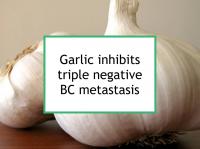Garlic consumption is associated with reduced risk of breast cancer, in part due to its organosulfur compound content. Garlic has been shown to inhibit DNA synthesis in human cancer cells and retard their growth, as well as suppressing angiogenesis and invasion. Garlic consumption is associated with reduced breast cancer risk in population studies.
Organosulfur compounds (diallyl sulfide, diallyl disulfide, diallyl trisulfide, diallyltetrasulfide, dipropyltetrasulfide, among others) are generated upon cutting or chewing garlic. Although some of the anticancer benefits of garlic are retained after cooking or processing it, raw garlic appears to have the most benefits. Now a new study has demonstrated how diallyl trisulfide inhibits triple negative (ER-/PR-/HER2-) breast cancer growth and aggressiveness through a newly-described pathway targeting a key enzyme of the Warburg effect.
Warburg effect
The Warburg effect is a form of deviant energetic metabolism whereby the rate of glucose uptake is significantly increased. Cancer cells exhibiting the Warburg effect produce energy mainly through a high level of glycolysis rather than through a low level of glycolysis as is the case in normal cells. Together with activation of key proliferative and survival signaling pathways, the Warburg effect plays a critical role in tumorigenesis. This suggests that compounds targeting key proteins involved in the Warburg effect could act as cancer treatment.
Garlic during chemotherapy
Garlic has been shown to have protective effects against doxorubicin-induced heart damage. However, garlic supplements have been shown to reduce the clearance of the chemotherapy drug docetaxel in some women, a result that is likely also to hold for paclitaxel.
Latest research shows how DATS interferes with the Warburg effect
The study referenced at the beginning of this news story was designed to elucidate how diallyl trisulfide (DATS) inhibits triple negative breast cancer cell proliferation and metastasis. It has been demonstrated in both cell and animal studies that DATS inhibits proliferation by inducing apoptosis (programmed cell death). However, the interaction of the Warburg effect with the apoptosis-promoting activities of DATS has not been examined.
In the current study, the authors show that DATS acts in part by downregulating lactate dehydrogenase A (LDHA), a crucial enzyme involved in the Warburg effect. DATS also inhibits the growth of breast cancer cells, particularly MDA-MB-231 triple negative cells, and reduces proliferation and migration. The authors also demonstrate that while DATS inhibits the Warburg effect in breast cancer cells, it does not greatly affect normal cells. The data shows that DATS inhibits breast cancer growth and aggressiveness through a newly-described pathway targeting a key enzyme of the Warburg effect. The authors conclude that LDHA downregulation is involved in the apoptotic effect of DATS on triple negative breast cancer.
